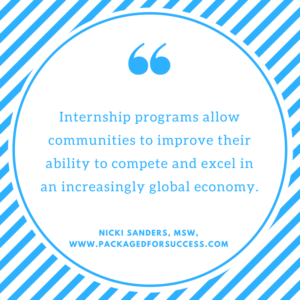How to create and manage a successful internship program (Part 1)
By Nicole Cendrowski, director of engagement, A-LINE Interactive
The key to a successful internship is to build a strong foundation before the interview process begins. First, develop a clear job description. Second, ensure you and your team have the time and energy to guide your future intern. Third, consider aligning yourself with an educational partner to filter your talent pool.
The foundation
When then-Clemson University senior Lindsay Odom learned about Endeavor’s marketing internship through one of her Erwin Center professors, and eventually landed the position, she was pumped. Endeavor is a collaborative coworking space for creative services agencies, client-side marketers, and freelancers in downtown Greenville.
As an Endeavor member, I observed the fun Lindsay and the team were having with this internship experience over the summer. Because I was also hearing from other college student friends about internships that weren’t faring so well, I’ve compiled guidance on how to create and manage a successful internship.
Be clear, committed, and connected
The key to a successful internship is to build a strong foundation before the interview process begins. First, develop a clear job description. Second, ensure you and your team have the time and energy to guide your future intern. Third, consider aligning yourself with an educational partner to filter your talent pool.
“We were creating our very first internship experience, so working with Clemson was enormously helpful, and not just from a talent pool perspective,” explains Shannon Wilbanks, managing partner at Endeavor. “The Erwin Center was able to provide great job description templates and information about how other employers had structured successful programs, and what’s expected from a university standpoint, like salary and class credit options.”
For structuring your internship job description, be sure to clearly communicate the role’s purpose, responsibilities, compensation, and what to expect, as well as deliverables, such as a case study or results report that provides value to both the company and the student’s portfolio.
“The role was very clear to me,” Odom explains. “And during the interview process, I quickly saw myself in it. I recognized that I’d be a hands-on, active part of the team. I felt confident bringing ideas to the table.”
Be inviting and inclusive
For Odom, the internship interview process wasn’t simply a half-hour meeting in a windowless conference room with her potential manager. While there was a series of interviews, she received an in-depth tour of the company’s office, met the team she’d be working with on a day-to-day basis, and attended company and client events.
“I felt included from day one, and it quickly gave me a sense of the Endeavor culture, its members, and role in the business community,” Odom recalls.
The time invested by all before the internship began made the first day easier and effective. “When I arrived, instead of ‘get organized and oriented,’ I hit the ground running on what I was hired to do. I was eager to get started. I’d already been staying up late jotting down ideas and thoughts on what to work on,” Odom says.
“We were looking for someone who was a self-starter, great at managing their time, and finding their own opportunities. We found that in Lindsay,” Wilbanks says. “When she identifies and recommends something to us, we consider it as seriously as anything anyone else on the team recommends.”
It is important to give your intern access to tools and resources so that they can “own” the work they have promised to do. This goes beyond providing the access code to the copy machine or voicemail system.
Also, the “little gestures” matter. Odom fondly remembers the small graduation party the team had for her: a simple, catered lunch. “Young people love food and sharing a meal. Even if it’s just a card or a cupcake, it’s the little things we remember,” she says.
Be aware
Your candidates, and ultimately whomever you hire, are watching you. They’re observing you communicate, manage, and lead. They are observing how your team interacts with one another. And reading between the lines. Their experience at your company during the interview process, as well as during the internship, will be shared with others: good, bad, or ugly.
Even if they don’t end up interning with you, they’ll tell their friends about their interview experience, if the person who interviewed them was nice, and what the office space was like.
“Young people won’t do an internship unless it comes across as a serious, legit opportunity, and if they have confidence in the company itself,” Odom says. “Once we say, ‘Yes,’ we’re all in and ready to do real work for you.”
Article originally appeared on Upstate Business Journal.
